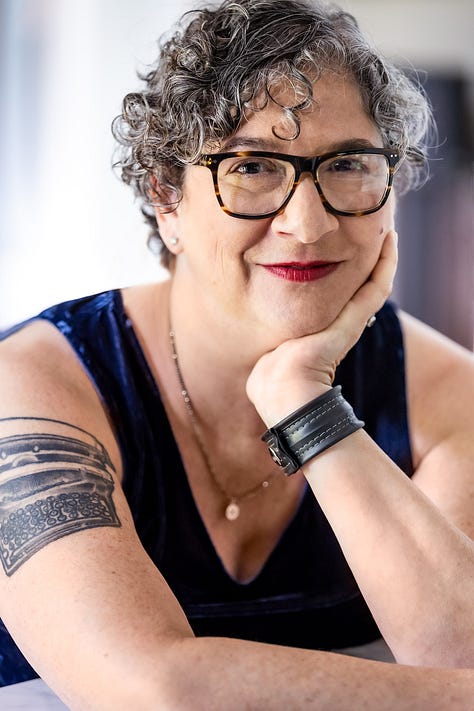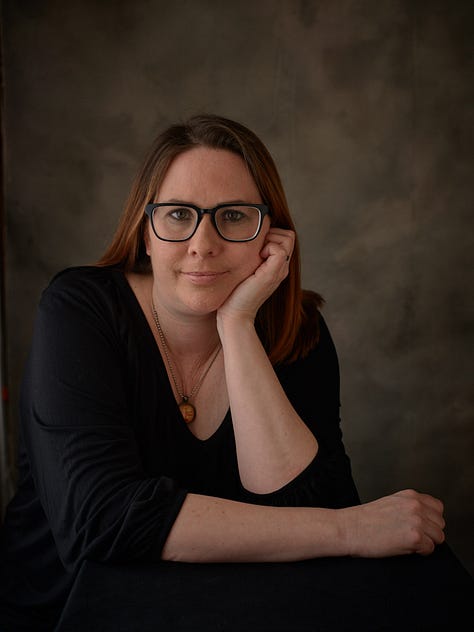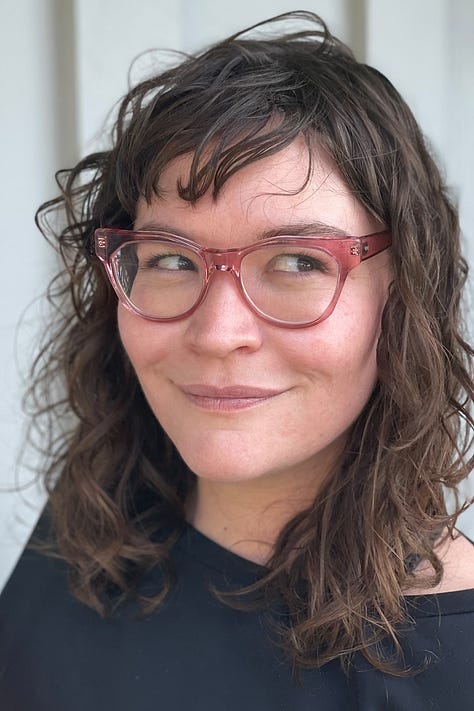The Other March Sisters by Linda Epstein, Ally Malinenko and Liz Parker
Publication Day today! Congratulations!
Qstack is absolutely thrilled to bring you this exclusive sneak peak on publication day—today, February 25, 2025—for the new book:
The Other March Sisters
by , Ally Malinenko, and Liz Parker



Giving all the “Little Women” the stories they deserve at last, this imaginative historical novel and companion to the much-loved classic draws Meg, Beth, and Amy March from behind the shadow of Jo – Louisa May Alcott’s alter-ego and the “author” of Little Women – as vibrant and unforgettable characters grappling with societal strictures, queer love, motherhood, chronic illness, artistic ambition, and more.
A riveting reimagining for readers of March by Geraldine Brooks, Sarah Miller’s Caroline and Maggie O’Farrell’s Hamnet.
“An intriguing take on some of the most beloved—yet, paradoxically, overlooked—characters in fiction. ” —Shana Abé, New York Times bestselling author of An American Beauty and The Second Mrs. Astor
Got a big announcement, an article or event , a special offer, a new book published? MESSAGE me
Qstack | The LGBTQIA+ Directory of Substacks highlights the diverse creative talent of queer writers on this exhilarating, maddening, ridiculous platform. Every post will always be free, but it takes an enormous amount of time and attention to produce.
Please support my work with a paid subscription. Click button for benefits. ~ MTF 💜🎩🐈⬛
Thank you to QStack for giving us a guest post today! It’s a very special day for us –Linda Epstein, Ally Malinenko, and Liz Parker – because today is the day our co-written book, The Other March Sisters, comes out! In celebration, we thought we’d post a few excerpts from the book. So far, most reviews have been favorable. People seem to really like the story, and we’re delighted. Of course we’d love everyone to like the book, but because we’re big readers ourselves, we understand that not every book is for every person. And that’s as it should be.
Many of the reviews from the readers who don’t like the book have been... interesting? Let’s just say the people posting the reviews are showing their true colors, and those colors are not rainbows! A lot of them seem to take issue with the same thing. Bet you can’t guess what they don’t like?! Just kidding! We all know it’s that pesky gay thing. You know that thing with those LMNOP letters. That queer thing. Because of course it is.
That all three of us included queer characters and themes in our stories (we each wrote a section) wasn’t planned. We are all queer, but we did not say, “Let’s take Little Women and force a gay agenda on it!” For the record, we have no problem with someone doing that, but that’s not what we did. We each had our reasons for writing our stories the way we did and reinterpreting and changing the original story. Keep reading, to learn a little bit about them.
On writing Meg, by Liz Parker:
So many fans of Little Women look to Meg March as the conventional, happily-ever-after, married sister—but I would argue those interpretations of Meg come from film adaptations and not the original text. In reading Little Women as an adult, it became clear to me that not only did Meg not want to get married, she wasn't happy in her marriage once she did. I took this, along with Meg's close female friendships from her girlhood, and crafted a story for her that would allow her to carve out a place in the world within the confines of the marriage she ended up in. Meg becomes a budding herbalist, and when her childhood friend—Annie Moffat—asks for her help to terminate a dangerous pregnancy, Meg turns to another herbalist in Concord to teach her. The woman is a widow and has taken up house with another woman, which gives Meg a lot to reflect on, including what her life might have looked like had she been able to grow old as a spinster alongside Annie. Did I make Meg March bisexual? I would argue that the seeds of her sexuality were in the original Little Women all along.
Rebekah’s face softened and she nodded slowly. “I’m sorry, but I don’t offer those sorts of services anymore.”
“I know, I—”
Rebekah held up a hand. “Please don’t try to convince me otherwise. I understand why you have come. Twins, and now another . . .” She offered Daisy a sad smile, hiding her face behind her hands then exposing it again. Daisy erupted in laughter, which had Demi squirming at Meg’s back to see what fun he was missing out on.
Meg reached a hand over her shoulder and ruffled his soft hair to keep him from trying to climb out of the sling. “It’s not for me,” she said.
Still, Rebekah shook her head. “It doesn’t matter who it’s for. The answer is no.”
“Becks,” the other woman said.
“I can’t,” Rebekah said. “We can’t.”
Meg blinked as Rebekah gripped the other woman’s hand, understanding dawning on her.
“Please,” Meg said. “I only want to talk.”
“At least hear what she has to say,” the other woman said, extending a hand toward Meg. “Marianne Smith.”
“You both live here?” Meg asked. “Together?”
“Widows,” Marianne said. “I lost my husband in the war, and Rebekah . . .”
Rebekah rubbed at the space between her eyes. “My husband passed a little over a year ago.”
“At least you don’t have to bear the weight of it alone,” Meg said, her gaze dropping to the women’s clasped hands. When she looked back up, Marianne arched an eyebrow, and her lips curved upward.
On writing Beth, from Ally Malinenko: When I decided to write a Beth story, it was important to me to give her something outside of her death – which is all she gets in Little Women. Beth knows she’s dying and seems to be fine with it and for some reason that never sat right with me. And it got worse after I was diagnosed with cancer in my 30’s. I felt a rage I had never experienced before and when I dug into the back story of the real Beth March I discovered she felt it too. In the book she just goes so willingly into that dark night and I knew that wasn’t the truth. I understand Louisa wanted to give her an easy death because her sister’s was not. I respect that. But I wanted to give her LIFE. I wanted to give her love. And I couldn’t imagine a love story that would involve a boy. How would they meet? How would that happen? But a girl? Yes. Very much so. A girl made sense. A girl would be someone that Beth could meet and get to know and no one would question it. A girl would be someone she could fall in love with. A girl made sense. Florida gives Beth something precious. Something that she will take into her death. Something secret and real and beautiful.
“I’m fine. It’s just . . . my father—” Florida’s voice caught, and Beth took her hand. This seemed to help, and after making a small, strangled noise in her throat, Florida continued. “My father has been offered a lecturing position, to speak to other freemen about civil rights.”
“Oh, but that’s wonderful!”
“Not here.”
Beth felt her stomach drop, as if she’d been pushed, violently, off a ledge. “Where?”
“Throughout the country and then eventually into Europe.”
“Oh,” Beth said softly. She stared hard and long at the wooden slats of the porch, the way the grain of the wood knotted and curled. The wood seemed to stretch away from her, the way time was now stretching away from her and taking Florida with it.
A small noise came from Florida. Something that pulled Beth out of her own thoughts. She reached up and brushed the errant tear away. “Oh, Florida, it’s what you wanted.”
“How can you say that?” It was barely whispered.
Beth forced herself to smile. She could be brave. “You’ll see so many places. New York. The South. The West. And then to Europe, where everything will smell of roses and you’ll drink fancy cocktails, and never have muddy hems and—”
“And,” Florida interrupted, “I won’t have you.”
Beth smiled hard, as if that could hold back the tears that pricked at her eyes. “We’ll write all the time.”
“I’ll be moving too much. Our letters will be lost.”
“No, they won’t. I’ll send a new letter every day. It will be filled with my strange little stories of stupid old Beth puttering around the house, which of course will be of no interest to anyone.” She wanted it to be a joke, but the words fell like little stones from her lips.
“I’m so sad to leave you, my Beth.”
“We’ll see each other again,” Beth offered, but she knew it was hollow. Florida would be gone for a long time. Years and years, and Beth knew in the darkest part of her heart that she didn’t have years. Not anymore. She knew it even if she couldn’t talk about it. It pulled at her, like the tide. She was running out of time and now Florida was leaving. Why was everyone always leaving her?
“Promise me you’ll keep practicing.”
“How shall we move a piano to all those places?”
“Oh, come now, you’re resourceful and terribly bright. You’ll find a way.” Beth offered a smile she didn’t feel, and bumped the girl’s shoulder. “You’ll get to see the world, Florida. Just like you wanted. This is a gift.”
Florida fixed her beautiful brown eyes on Beth and said, “Then why does it feel like something I do not want?”
On writing Amy, by Linda Epstein: One of the things that was important to me when writing Amy’s story was to try to accurately represent what it was like to be a woman and an artist in the late 19th century. Louisa May Alcott modeled the Amy character after her sister May, who was an artist. When I did my research, I happily stumbled upon Rosa Bonheur, considered the most famous 19th century female artist, and the first woman to be decorated with the French Legion of Honour. Bonheur lived with her partner, Nathalie Micas, for over 40 years. When Micas died, Bonheur lived the rest of her life with her partner, the artist Anna Klumpke. Representation matters. We queers have always been here. There was no way I was going to write a historical novel that didn’t show that. Especially now.
Here's an excerpt from a letter from Amy to Laurie, after Amy and her cousin Florence visit Rosa Bonheur at her home in Fontainebleau...
Besides leading to this artistic introspection, our tea with Madame Bonheur was educational in so many other ways. I’ve never met a woman like her, either at home or abroad. She lives her life so blatantly in opposition to societal expectations. Florence thinks her scandalous because she wears clothing like a man both at home and out in society, and styles her hair short in a masculine fashion. She even smokes a cigarette, Laurie! I believe her more comfortable and confident than any woman I’ve met.
RB made me think about what you wrote in your letter to me before you left Concord. I think our Jo might be such a one as Madame Bonheur. Jo has always been greatly influenced by Father and Mother’s way of looking at the world. Even though they are forward thinking, they would never bless a life for our Jo such as Madame Bonheur lives. RB companionably resides with her Miss Micas, who has been her helpmeet for over twenty years. Imagine that, Laurie! Can you? Is this what you inferred when you spoke of “a Boston marriage”? Are there indeed women at home who do that? I think our Jo might be able to find happiness in that way.
We hope you’ve enjoyed this little peek into why we wrote the March sisters the way we did. If you want to see how their stories turn out, The Other March Sisters is available now.
Liz Parker is an herbalist, witch, and an author whose works include In the Shadow Garden and the collaborative novel The Other March Sisters. She grew up in Tennessee and Nevada, but now lives in California with her husband, their dog, and too many houseplants to name. She can be found online at LizParkerWrites.com and on most social media platforms at @LizParkerWrites.
Ally Malinenko is a poet, librarian, and author whose novels include the Junior Library Guild selection and Bram Stoker finalist This Appearing House, Ghost Girl, and the collaborative historical novel The Other March Sisters. She lives in Brooklyn, NY, where she writes in the early hours of the morning. She can be found online at allymalinenko.com and @allymalinenko on Instagram.
is a literary agent at Emerald City Literary Agency, freelance editor, and author whose novels include Repairing the World and The Other March Sisters. She lives in upstate New York with her ridiculous designer mutt, Gertie Gertstein. You can find her online at lindaepsteinauthor.com and @lindaepsteinauthor on Instagram.









Congrats Ally, Linda, and Liz! I'm especially excited to read about Beth's love...I totally agree that giving her more of a life is a fantastic idea. What an enormous boon for all of us queer Little Women fans!
Congratulations, it’s a fascinating subject and an amazing achievement 🥳